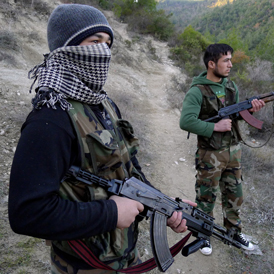Has Syria reached the point of no return?
As the Arab League struggles to restore order in Syria, defence analyst Anthony Tucker-Jones reports that the popular rising has now reached a tilting point.
Last summer I warned that the Syrian army held the key to the country’s future. All the time that it remained loyal to President Bashar al-Assad the chances of regime change were highly unlikely.
Against paramilitary forces over 100,000 strong, backed by an army some 200,000 equipped with 4,500 tanks, the demonstrators stood little chance. If elements of the army changed sides or refused to shoot on the crowds, as in the case of Libya and Egypt respectively, then that was a different matter.
Six months on a steady trickle of deserters have created the Free Syria Army which has begun to wage a guerrilla campaign to force international intervention.
The FSA claims to have some 25,000 men under its command, in effect two and a half divisions. Whatever its true strength the problem was always securing arms and ammunition.
Now that Syrian deserters have found sanctuary across the border in Turkey and the support of Turkish, US and Libyan intelligence its noticeable how the FSA attacks have been escalating. Most notably with a double bomb blast in Damascus last week that killed over 40.
The fact that the Sudanese general leading the mission is suspected of crimes against humanity in Darfur does little for the Arab League’s credentials.
Over the past week Arab League monitors have had the forlorn task of trying to oversee a return to law and order across Syria’s principal cities.
This is the last thing the FSA and other opposition groups want, a mounting death toll serves their cause as it gains international media coverage.
The arrival of the monitoring mission at the end of December to implement the peace plan agreed two months earlier is now too little to late.
The fact that the Sudanese general, Mustafa al-Dabi, leading the mission is suspected of crimes against humanity in Darfur does little for the Arab League’s credentials (his boss President Bashir of Sudan is wanted by the International Criminal Court).

The Syrian Army was supposed to withdraw from the cities, political prisoners let out and talks held with the opposition’s Syrian National Council.
Instead the Syrian military moved to snuff out the Sunni unrest in the city of Homs once and for all by attempting to overwhelm the rebellious Bab al-Amr neighbourhood.
Tanks and other infantry fighting vehicles withdrew from thee streets of Homs on 27 December as around 70,000 demonstrators took to the streets for the benefit of the monitors. In fact the tanks remain within hailing distance.
It is clear that the FSA are prepared to sacrifice themselves in order to provoke international intervention. All the time that the death toll mounts in Homs and other Syrian cities it means the United Nations cannot sit idly by.
Read more from Channel 4 News: Inside Syria
Syria has descended into open warfare with the rebels making the Arab League mission an embarrassingly nugatory exercise.
The reality is that the monitors can only operate in five groups under the watchful eyes of official minders in Hama, Homs and Idlib province – so they will only see what the authorities want them to see.
The ‘official line’
The official line is that Syria is beset by terrorist groups and Islamist extremists – everyone knows that this is nonsense.
It is qute likely that Hom’s Sunnis have been seeking assistance from their co-religionists in Iraq. The Iraqis certainly have plenty of guns to spare.
The SNC wants the UN to back the Arab League; the implications of this are obvious. If the plan fails then the UN will be obliged to instigate a no fly zone along the Syrian-Turkish border thereby invoking the “Benghazi” solution.
The FSA will then have a safe haven within Syria from which to operate and push south toward Damascus.
The Syrian crisis has clearly reached a critical tilting point and in the coming weeks something will have to give, regardless of the actions of the Arab League and UN.
Syria’s generals must now be asking themselves at what point should we stop shooting our fellow country men.
Anthony Tucker-Jones is a freelance defence writer and an expert on regional conflicts. He is also the terrorism and security correspondent for intersec – The Journal of International Security.